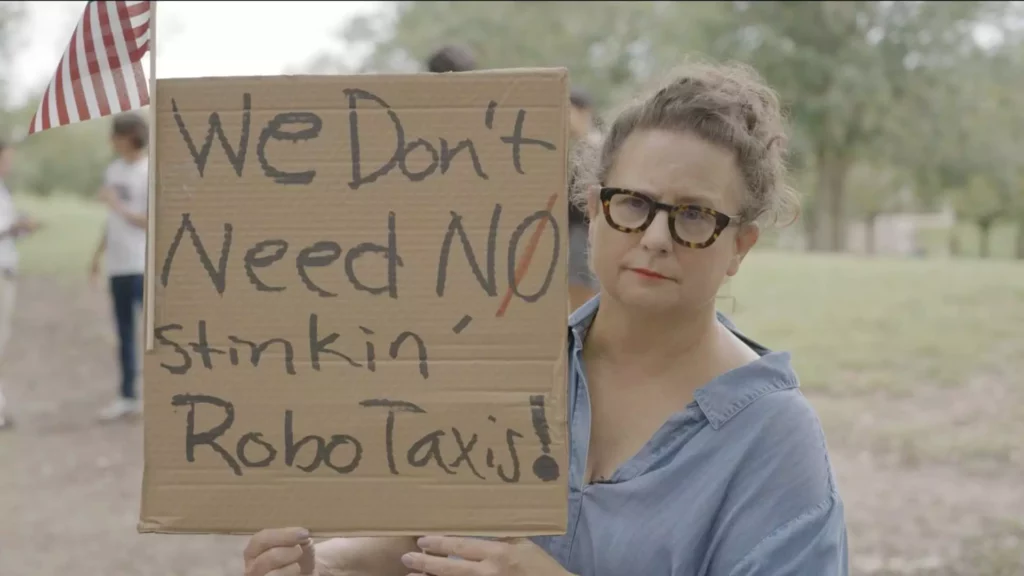As Tesla gears up for its highly anticipated robotaxi pilot program in Austin, Texas, skepticism looms large on the horizon. Scheduled to launch on June 22, this ambitious project has sparked protests from various community groups that emphasize the need for safe and accountable technological advancement. While proponents of the robotaxi service herald it as the next step in the evolution of transportation, the palpable discontent from activists underscores a cautionary sentiment. It’s not just about embracing innovative technologies; it’s a pressing dialogue about whether we are willing to brush aside fundamental safety principles for the allure of progress.
The development of autonomous vehicles (AVs) comes with undeniable promise. However, the demonstrators rallying against the robotaxi service frame their concerns not as opposition to innovation, but as a demand for responsible oversight. Organizations like the Dawn Project and Tesla Takedown argue that the rush to implement AV technology—largely driven by the ambitions of Elon Musk—might disregard essential discussions about safety. They point to historical data showing a concerning number of incidents involving Tesla vehicles utilizing partially automated driving systems. It’s crucial to dig deeper into this troubling dynamic: how do we ensure that technology serves humanity rather than jeopardizes it?
Data-Driven Dissent
A critical look at the statistics about Tesla’s Autopilot and Full Self-Driving (FSD) capabilities reveals a disquieting reality. The National Highway Traffic Safety Administration reports hundreds of collisions involving Tesla vehicles equipped with these systems, including some tragically fatal incidents. The juxtaposition of such sobering data against Musk’s buoyant proclamations about the transformative potential of autonomy creates a chasm filled with fear and mistrust. Public sentiment reflects a growing belief that excitement for innovation may overshadow the pressing need for transparent safety evaluations.
Recent protest actions have further fueled this dialogue. Demonstrators simulated an alarming scenario where a Model Y with FSD software failed to halt for a stop sign, nearly “hitting” a child-sized mannequin. This stark visual serves not only as an indictment of automated driving systems but as a poignant reminder of the potential real-world implications of rushing untested technology into the public sphere. These fear-driven performances highlight a widespread yearning for reliable assessments and regulations that ensure technological advancements do not come at the cost of public safety.
Musk’s Controversial Ties and Public Distrust
Opposition to Tesla’s robotaxi service is further intensified by Elon Musk’s notable ties to the previous administration, particularly under Donald Trump. Such connections inevitably cast shadows over the company’s intentions, influencing public perception and heightening skepticism towards the proposed robotaxi program. Protesters articulate a strong sentiment that a conflation of political influence and technological innovation could spell disaster, particularly in an arena marked by ethical ambiguities.
Public trust is not a trivial matter, particularly when it comes to safety. Individuals like Stephanie Gomez, a direct voice among the demonstrators, make it clear that mistrust runs deep—not just concerning technology but regarding corporate accountability embedded in Musk’s political affiliations. This confluence of variables raises critical questions: Can Tesla reassure the public regarding its safety commitments without the distractions of past political entanglements? Failure to foster trust could result in a significant hesitance toward adopting this new mode of transportation, potentially stalling the very progress Tesla aims to achieve.
The Ethical Dilemma of Automation
The ongoing discourse surrounding the robotaxi initiative implores us to consider a larger ethical quandary: What does responsible innovation truly mean in the realm of autonomous technology? The excitement surrounding the allure of self-driving cars must be tempered with a rigorous examination of societal implications and safety measures. Advocates for public safety are not merely detractors of progress; they are champions of ethical technology that prioritizes human welfare above all else.
In a landscape characterized by rapid technological change, leaders in the industry must heed the concerns raised by advocacy groups and the general public. Acknowledging these serious safety concerns is not a deterrent to innovation; rather, it is an essential component of creating a future where technology enhances lives without compromising safety. As electric and autonomous vehicle technologies continue to advance, the conversations about regulation and accountability must keep pace, ensuring that advancements serve to uplift rather than endanger our communities.









Leave a Reply